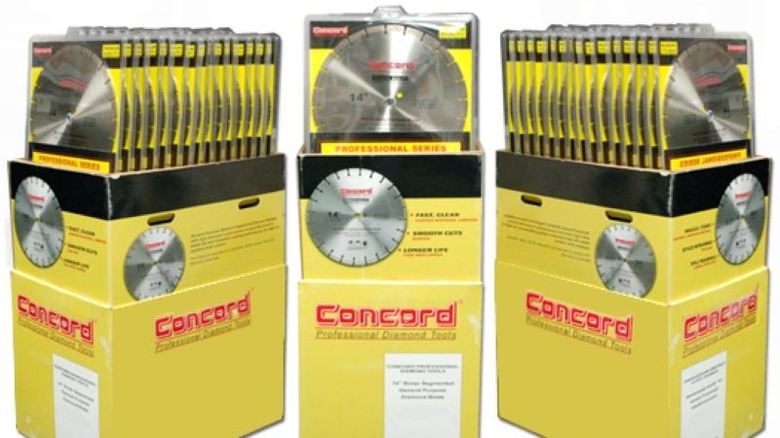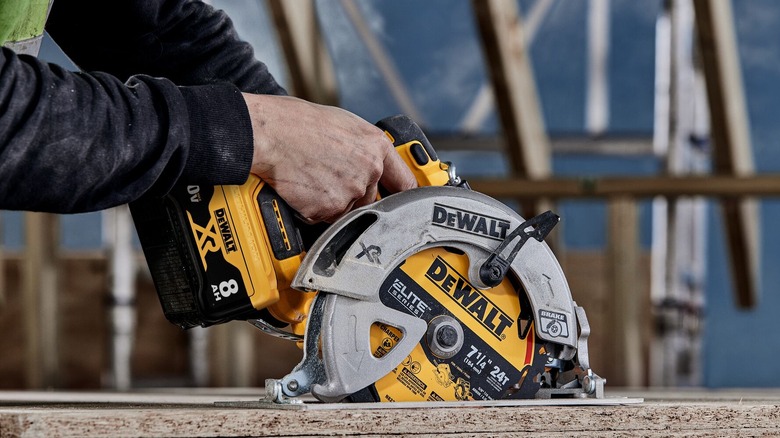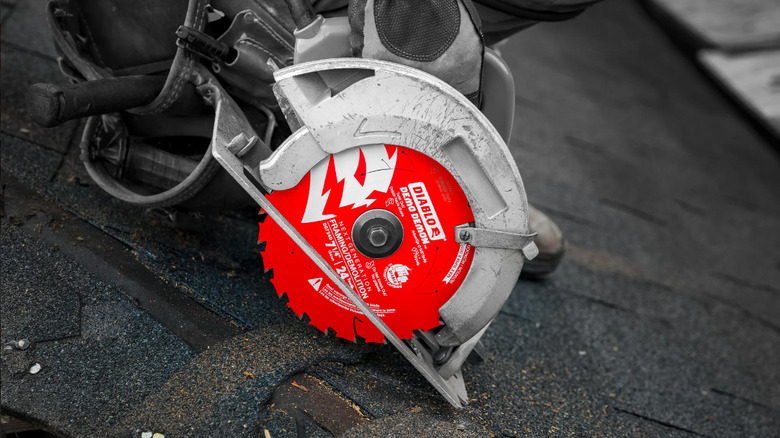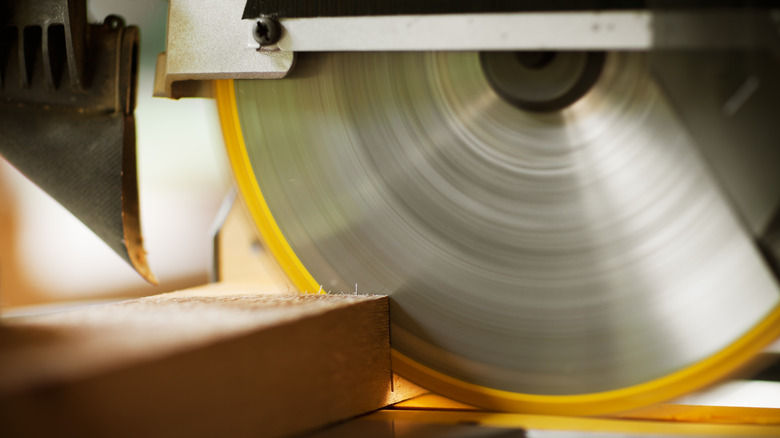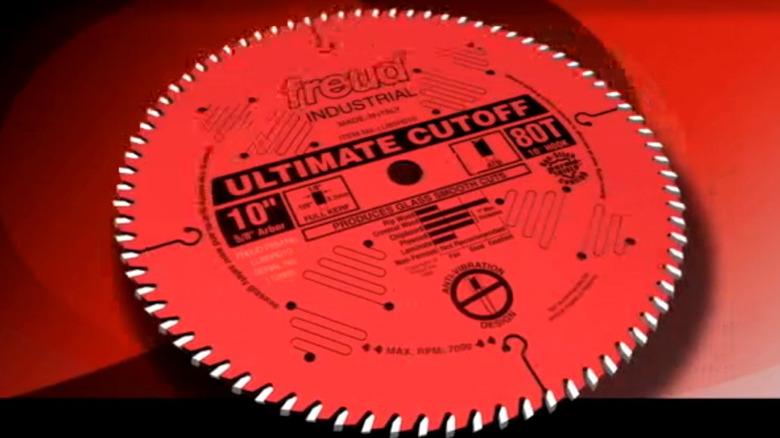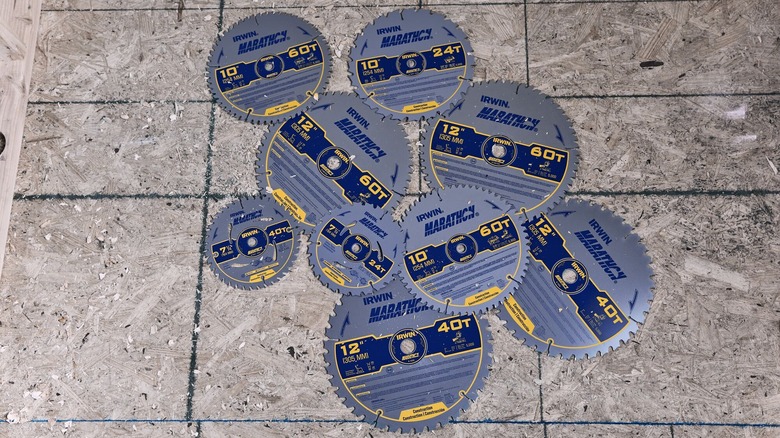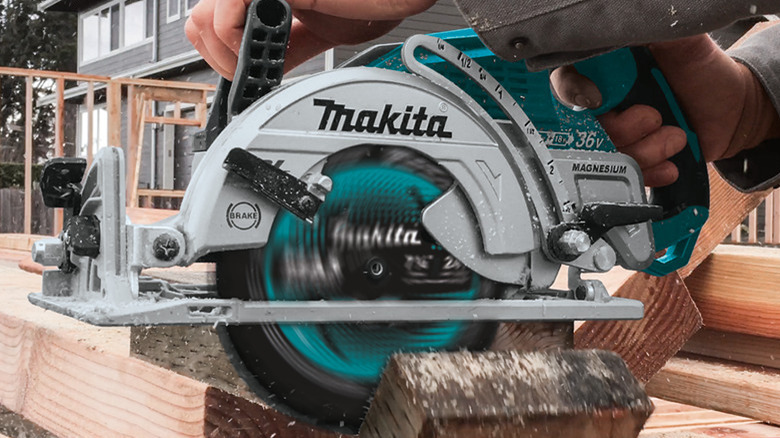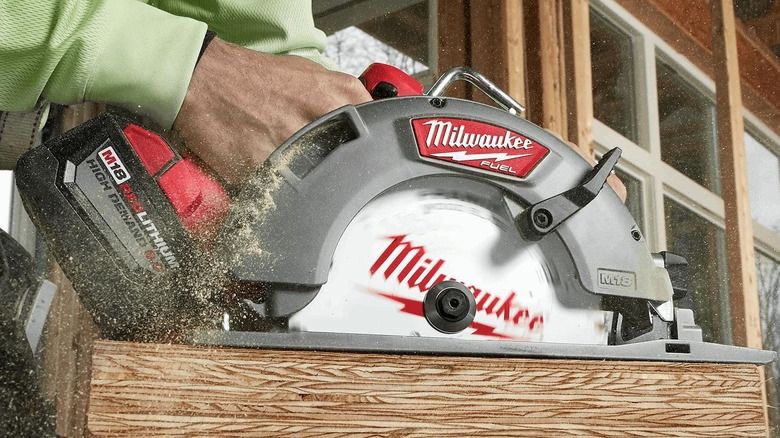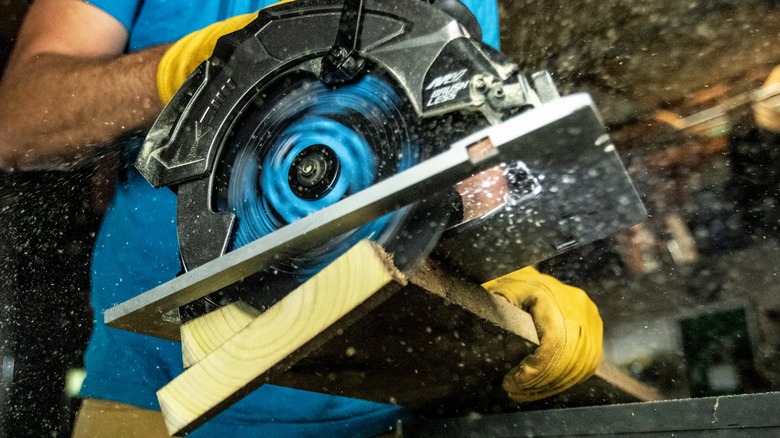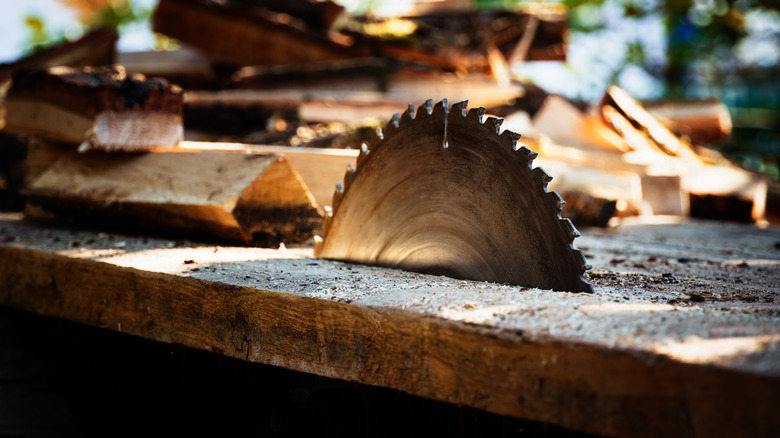Saw Blade Buyer's Guide: Top Brands And Affordable Picks
We may receive a commission on purchases made from links.
A saw blade is an odd tool in that it's crucially important to some, but barely noticed by others. There are folks who still have the blade that came with their miter saw from 1985, while others won't even leave the store without four distinct blades for different jobs. And while circular saw, miter saw, and table saw blades are largely (but not always) interchangeable, hobbyists and pros alike often take the time to purchase multiple blades for each specific tool, preparing them for any upcoming tasks.
Saw blades are generally mass-produced from a sheet of metal, with tips adhered to the teeth afterward. Differences in the angle, thickness, number, alignment, and composition of those teeth and tips can make the blade better for certain cuts or materials. And while one can easily purchase any number of "all-purpose" blades for remarkably low prices at their nearby big-box hardware store, serious woodworkers have their favorites. SlashGear has reviewed the opinions of several sources, from YouTubers to local craftsmen, to bring you this list of the top saw blade brands, and some affordable picks from each of those toolmakers.
While prices vary wildly from brand to brand, making "affordable" more of a relative term, it's important to note that several of our higher-priced options can be sharpened after use, making the blade an investment rather than a disposable tool.
CMT Orange Tools
Italian toolmaker CMT Orange Tools has been in business since the 1960s, and it specializes in woodworking tools like router bits and saw blades, with product lines for industrial or commercial use. This is a company that markets itself as a maker of high-quality tools, using high-grade German steel for blade bodies that are cut with CNC machine equipment — blades and even arbor holes are laser-cut rather than punched out, ensuring perfect balance and fit. Even CMT's trademarked orange color isn't just a marketing gimmick, but a non-stick coating protecting the tools from residue buildup and burning.
One of the company's most popular blades on Amazon is the ITK Plus Combination blade, which features laser-cut heat expansion slots and a thinner kerf to reduce wasted material. At around $50, the CMT blade hovers right around the middle of the pack as far as price is concerned, but its construction and coating are made to last.
Kerf is often listed on saw blades as the blade's thickness, although that's not entirely accurate — the kerf is actually the width of the cut made by the blade. If a blade is prone to wobbling, as a thinner blade is prone to, or if the material being cut is soft, or if the saw simply isn't perfectly aligned, then the kerf can end up being a bit wider than the blade itself, leading to inaccurate measurements if it's not taken into consideration.
Concord
Concord Industrial Products manufactures a number of tools and blades, with its main focus on its diamond tools and blades. Diamond blades are generally used for things like grout removal, tile cutting, and masonry applications, and generally are built with radically different toothing than traditional wood blades — or with no teeth at all.
However, the company makes a wide variety of great woodcutting blades as well, such as this 7-¼" 30-tooth general woodcutting blade. The blade's design is perfect for ripping apart softwood lumber, making it ideal for a chop saw on a job site. The 30 alternating top bevel teeth leave a rough edge, but as this blade is made for quickly getting framing studs cut, that's not really an issue.
It lacks the nonstick coating that many of its competitors (and several of Concord's other blades) have, but at under ten bucks, it's a fast and durable blade, allowing a cutter to spend a little less time getting framing boards ready and more time installing them.
DeWalt
At the time of writing, five of Amazon's top twenty best-selling circular saw blades are from DeWalt. However, it's not just low prices and popular opinion that keep customers coming back to the bright yellow brand — DeWalt's blades are well reviewed by both customers and pros on a number of sites. The toolmaker's saw blades are just as well-regarded as its tools, and even choosy woodworkers recommend DeWalt's blades alongside some of the more expensive specialty brands on our list.
DeWalt's construction blade combo pack includes 10" blades in both 60- and 32-tooth variants, which pair well for woodworkers or DIYers looking for a reliable set of blades for both general cutting and finer finish cuts. Many users have mentioned that it's a great way to replace blades for both their table saws and miter saws in one convenient package. The thin kerf of these blades generally means less lost material, but because thinner blades can wobble a bit, measuring with that kerf factored in is always recommended when precise cuts are required.
Diablo
A brand mentioned on nearly every woodworker's shortlist of recommendations is Diablo. While the Diablo brand name has only been around since 2000, Diablo's saw blades have become renowned as some of the best affordable blades on the market. To get ahead of some confusion, as Diablo blades are often sold as "Freud Diablo" or "Diablo by Freud": Diablo is a Freud brand, and Freud has been owned by Bosch since 2009, but manufacturing of Diablo and Freud blades is still done at Freud's facilities.
Since Diablo produces its own trademarked MicroGrain Carbide with Titanium, and its own ceramic metallic blend for saw blade teeth, the company is able to manufacture a number of specialized blades for several materials, from soft wood to half-inch-thick metal. Its 7-1/4" Framing Saw Blade is everything one would expect from the brand — it's an affordable blade with great reviews that cuts quickly and reliably, perfect for multiple cuts on framing boards and 2x4s. This blade features a cool little innovation, as well — the Tracking Point is a symmetrical third tooth that Diablo claims can provide straighter cuts while also increasing the longevity of the blade. Nonstick coating and laser-cut stabilizer vents also provide vibration and noise control. At only $11, it's a great blade with a number of unique features.
Forrest
For over 75 years, Forrest Manufacturing has been owned by its namesake family, with fourth-generation children working for the company today. It's a rare thing both on this list and in the toolmaking world as a whole for a family-owned company to maintain ownership of its company, but the high quality of Forrest saw blades has kept the business afloat. The company has won several awards for its saw blades over the years, with one blade in particular having collected praise from several woodworking publications.
The company's Woodworker II blade, while expensive when compared to some of our other picks, has earned a reputation among professional woodworkers and high-end hobbyists as one of the best general-use saw blades available. The blade, which can be sharpened rather than replaced, can do the job of rip, crosscut, and combination blades, minimizing time wasted swapping out blades. Cuts are often smoother than many other brands' best offerings, and Forrest Manufacturing is constantly credited with great customer service. The company even invites customers to send in blades for sharpening, tooth replacement, and several other services.
While the price may put some weekend warriors or general contractors off Forrest's blades, serious craftsmen and artisans swear by the company's high-quality, American made products.
Freud
Freud has been in business for over fifty years, established in Northeast Italy in 1962. As previously mentioned, the company manufactures both its own and Diablo's blades, but we've chosen to list the brands separately as they're marketed to different users, and feature different specs that lean into the woodworking and construction aspects of saw blades. Even though Freud is under Bosch's purview these days, Freud has maintained the attributes and blade characteristics that have put its tools in the hands of craftsmen for decades.
Freud's Next Generation Premier Fusion General Purpose Blade is one of its most popular, with many reviews claiming that the blade's proprietary carbide blend and alternating top bevel tooth design make for smooth, glue-line joints. It's capable of both ripping and crosscutting with the same degree of precision, and it's a laser-cut tool that has the expected anti-vibration slots and anti-stick coating one would expect from a high-end blade. And while Freud's blades cost a little more, making it more appropriate for serious woodworkers, the company does have certified sharpening services available in most states, saving customers money on replacement blades.
Irwin
Irwin's blue-and-yellow tools are a common sight in any shop or garage, and have been for almost two hundred years. While the company is probably best known for its Vise-Grip locking pliers, Irwin manufactures hundreds of hand tools, drill bits, and storage options for carpenters, mechanics, and DIY enthusiasts. Its circular saw blades are well-known for being durable and affordable.
Irwin makes a number of specialized saw blades; for example, its Marples line of blades is geared toward fine woodworking. Irwin's 7-¼" vinyl siding blade is another example of one of its specialty products — its carbide teeth are staggered, with every other tooth slightly thinner to improve cut speed. The heat vents and expansion slots work together to reduce vibration, increasing blade life and keeping cuts straight, and the 120-tooth count makes cutting through housing products like siding, gutters, and PVC piping smooth and easy. The company claims this siding blade, and all of its Marathon line of blades, last 50% longer than standard Irwin blades due to stronger bonds on its teeth and a fully hardened plate.
Makita
Makita is often mentioned in top tool brand lists across the internet, with its drills and chainsaws among the best, according to SlashGear. The teal brand is one of the most popular for pros and contractors, with its reliable tools (and even some weird ones) often showing up in workshops and on job sites.
Coming from one of the top toolmakers in the country, Makita's saws are well known for a good balance between power and portability, and they feature Makita blades in those saws. While many tool users will swap out the stock blade when setting up a new tool, Makita's blades have such a good reputation that they're often left in the machine.
Specifically, the Makita Max Efficiency Carbide-Tipped Blade is often reviewed as one of the fastest-cutting blades available, perfect for cordless circular saws where cutting time before needing a recharge is at a premium. Makita's blade design, which incorporates a thin kerf and coated ATAFR (Alternate Top Alternate Face with Raker) tips that allow for a smoother and faster cut.
Milwaukee
While the company itself was founded in 1924, popular toolmaker Milwaukee has only gotten into the saw blade game recently, releasing its first wave of circular saw blades in 2018. This is a little surprising, as Milwaukee produces a number of great tools specifically for carpenters and woodworkers.
Milwaukee's Fine Finish blade has several of the traits that its competitors use, like laser-cut vibration slots and an anti-friction coating to reduce heat while minimizing gumming and wobble. Its alternating-tooth bevel reduces tearout while also removing chips and debris during a cut, keeping the blade cleaner longer. And the thin kerf is great for cordless tools, as the design provides longer runtime in cordless saws and faster cutting in corded ones.
Unlike Makita, Milwaukee isn't including its namesake saw blade as stock with its tools just yet. However, at under $20, Milwaukee's many proponents won't hesitate to drop a little extra to make sure their replacement blades feature that instantly recognizable branding.
Spyder
Our last, and often lowest-priced, brand is Spyder. Founded in 2007, Spyder has quickly developed a reputation as an innovative toolmaker that makes affordable and unique tools. The company was started by one invention — a scraping attachment for reciprocating saws, designed to eliminate the tedium and strain of manual material scraping. After winning several hardware awards, the Spyder Scraper was sold to a pair of entrepreneurs who have grown the company into a full-on North American powerhouse, where Spyder produces dozens of innovative accessories for drilling, cutting, sanding, and more.
Spyder Tools' 7-¼", 24-tooth rough finish blades are often touted for their cutting speed and clean cuts, with head-to-head tests putting Spyder's blades among some of the fastest-cutting available. At under $15 for a two-pack of blades, it's easy to dream about swapping out every blade in one's garage or wood shop with multiple Spyder blades for every type of cut or lumber imaginable; fortunately, Spyder makes blades for several specialized applications, including demo, framing, and fiber cement board cutting.
Methodology
SlashGear decided which brands, and which representative saw blades, were included in this article using a variety of factors. Online reviews, product comparison videos, social media impressions and conversations, the author's personal experience with several of these blades as an amateur woodworker and homeowner, and feedback from other woodworking enthusiasts were all considered.


